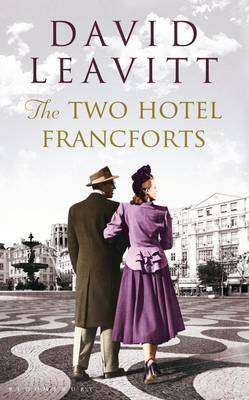Book Review – THE TWO HOTEL FRANCFORTS by David Leavitt
 The Two Hotel Francforts Synopsis:
The Two Hotel Francforts Synopsis:
It is the summer of 1940, and Lisbon is one of the only neutral ports left in Europe – a city filled with spies, crowned heads and refugees of every nationality, tipping back absinthe to while away the time until their escape. Awaiting safe passage to New York on the S. S. Manhattan, two couples meet: Pete and Julia Winters, expatriate Americans fleeing their sedate life in Paris; and Edward and Iris Freleng, elegant, independently wealthy, bohemian, and beset by the social and sexual anxieties of their class. Swept up in the tumult, the hidden currents of the lives of these four characters – Julia’s status as a Jew, Pete and Edward’s affair, Iris’s increasingly desperate efforts to save her tenuous marriage – begin to come loose. This journey will change the four of them irrevocably, as Europe sinks into war. (Booktopia)
BOOK REVIEW by Tony Ziemek
This fascinating novel from David Leavitt reminded me of a short story in Julian Barnes’ A History of the World in 10½ Chapters. That story, ‘The Visitors’ is about the hijacking of a cruise ship and the lottery of nationality experienced by hostages, when confronted with terrorists.
The sequence of who gets shot first in such circumstances is typically:
Equal First: Americans and Israelis;
Second: British.
After that, it gets confusing according to the degree of education or political orientation of the terrorists. For example, are the Irish, fellow terrorists against British imperialism or closely allied to them?
Canadians? Members of the British Commonwealth, almost Americans or a quite different and independent nation that doesn’t much care for the USA?
Australians? They get confused with Austrians – probably a good thing as it … buys time.
The Two Hotel Francforts is not just about nationhood but it is impossible to diminish the importance that the lottery of birth plays in life and in the book. As World War II spread throughout Europe, refugees converged in neutral countries with ports that might offer escape. Britain and America dispatched ships to collect their nationals, whereas Belgians and French, for example, had no refuge and endured an endless round of visa-seeking interviews with officials of varying sympathy.
The reason so many hopefuls were in Lisbon was (according to the novel) the result of a Portuguese Consul in France, who ignored his instructions and approved the visas of every single applicant. A Rabbi stamped the passports and the Consul signed them. They worked late into the night, long after other embassies and consulates had dutifully closed.
The foregoing is vital context but the main plot of The Two Hotel Francforts must be skirted around to avoid a review that would spoil the surprise and the confrontation that it brings. I thought I knew where this plot was headed but I was wrong. It is a subject rarely addressed and carefully treated. Characters and their relationships are beautifully created.
The novel’s setting is a delight, enhanced by imagery that leads the reader through the Lisbon of 1940. There is subtle use of some slippery symbolism. Its precise meaning is allusive rather than explicit but it enhances the plot, themes and atmosphere and suggests multiple layers of interpretation and nuance.
If this all sounds a little dry I apologise, because The Two Hotel Francforts is an enthralling, character driven read but a difficult book to review without giving away too much.
BOOK RATING: The Story 4.5 / 5 ; The Writing 4.5 / 5
~ Tony Ziemek is the lead editor of Ed Fresh Editorial Services.
Disclosure: If you click a link in this post we may earn a small commission to help offset our running costs.
Sign up to our Booklover Book Reviews emails and receive our gift for new subscribers. LEARN MORE >>
Have you read The Two Hotel Francforts ? Do you want to?
Join the discussion below.
BOOK DETAILS: The Two Hotel Francforts by David Leavitt ( Booktopia | Kobobooks | Amazon )
Genre: Historical, Romance
Author Information: David Leavitt’s fiction has been a finalist for the PEN/Faulkner Prize, the National Book Critics’ Circle Award and the LA Times Fiction Prize, and shortlisted for the IMPAC Dublin Award. His writing has appeared in the New Yorker, the New York Times, Harper’s and Vogue, among other publications. He lives in Gainesville, Florida, where he is Professor of English at the University of Florida and edits the literary magazine Subtropics.
* Receiving this title free from BloomsburyAustralia did not impact the expression of honest opinions in the review above.

